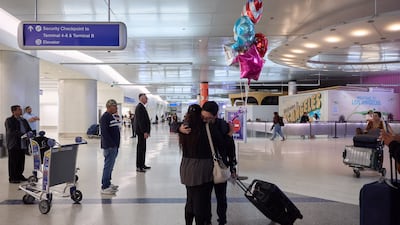Iran on Saturday said the US travel ban on Iranian citizens and 11 other mostly Middle Eastern and African countries was a sign of a “racist mentality”.
The move, which is expected to take place on June 9, is "a clear sign of the dominance of a supremacist and racist mentality among American policymakers," Alireza Hashemi-Raja, the foreign ministry's director general for the affairs of Iranians abroad said in a statement.
The decision "indicates the deep hostility of American decision-makers towards the Iranian and Muslim people", Mr Hashemi-Raja said.
US President Donald Trump's decision will bar citizens from 12 countries including Afghanistan, Myanmar, Chad, Congo Republic, Equatorial Guinea, Eritrea, Haiti, Iran, Libya, Somalia, Sudan and Yemen.
Mr Trump said the list could be revised and new countries could be added.
The ban, which Mr Trump said was necessary to protect against "foreign terrorists", is a similar move he implemented during his first term in office from 2017 to 2021, when he barred travellers from seven Muslim-majority nations.
The ban has been justified on national security grounds following a firebomb attack at a pro-Israel rally in Colorado. The alleged attacker, Mohamed Soliman, is from Egypt, which is not on the list.
Mr Hashemi-Raja said the policy "violates fundamental principles of international law" and deprives "hundreds of millions of people of the right to travel based solely on their nationality or religion".
The foreign ministry official said that the ban was discriminatory and would "entail international responsibility for the US government", without elaborating.
Since 1979 Iranian revolution, Washington and Tehran severed diplomatic ties and relations have remained deeply strained since.
It is known that the US is home to the largest Iranian community outside Iran.
According to figures from Tehran's foreign ministry, there were some 1.5 million Iranians in the US in 2020.
Mr Trump enacted a so-called Muslim ban during his first term, barring citizens of several Muslim-majority countries and others from entering the US.
Travellers from Cuba, Iran, Libya, North Korea, Somalia, Sudan, Syria, Venezuela and Yemen were barred from entry. The policy went through several iterations before it was upheld by the Supreme Court in 2018.
Mr Trump has blamed the immigration policies of former president Joe Biden for rising crime in the country, and he has been swift to issue executive orders, cracking down on people entering the country illegally.
The National's picks
4.35pm: Tilal Al Khalediah
5.10pm: Continous
5.45pm: Raging Torrent
6.20pm: West Acre
7pm: Flood Zone
7.40pm: Straight No Chaser
8.15pm: Romantic Warrior
8.50pm: Calandogan
9.30pm: Forever Young
Killing of Qassem Suleimani
No more lice
Defining head lice
Pediculus humanus capitis are tiny wingless insects that feed on blood from the human scalp. The adult head louse is up to 3mm long, has six legs, and is tan to greyish-white in colour. The female lives up to four weeks and, once mature, can lay up to 10 eggs per day. These tiny nits firmly attach to the base of the hair shaft, get incubated by body heat and hatch in eight days or so.
Identifying lice
Lice can be identified by itching or a tickling sensation of something moving within the hair. One can confirm that a person has lice by looking closely through the hair and scalp for nits, nymphs or lice. Head lice are most frequently located behind the ears and near the neckline.
Treating lice at home
Head lice must be treated as soon as they are spotted. Start by checking everyone in the family for them, then follow these steps. Remove and wash all clothing and bedding with hot water. Apply medicine according to the label instructions. If some live lice are still found eight to 12 hours after treatment, but are moving more slowly than before, do not re-treat. Comb dead and remaining live lice out of the hair using a fine-toothed comb.
After the initial treatment, check for, comb and remove nits and lice from hair every two to three days. Soak combs and brushes in hot water for 10 minutes.Vacuum the floor and furniture, particularly where the infested person sat or lay.
Courtesy Dr Vishal Rajmal Mehta, specialist paediatrics, RAK Hospital
Key facilities
- Olympic-size swimming pool with a split bulkhead for multi-use configurations, including water polo and 50m/25m training lanes
- Premier League-standard football pitch
- 400m Olympic running track
- NBA-spec basketball court with auditorium
- 600-seat auditorium
- Spaces for historical and cultural exploration
- An elevated football field that doubles as a helipad
- Specialist robotics and science laboratories
- AR and VR-enabled learning centres
- Disruption Lab and Research Centre for developing entrepreneurial skills
COMPANY%20PROFILE%20
%3Cp%3E%3Cstrong%3EName%3A%3C%2Fstrong%3E%20Haltia.ai%0D%3Cbr%3E%3Cstrong%3EStarted%3A%3C%2Fstrong%3E%202023%0D%3Cbr%3E%3Cstrong%3ECo-founders%3A%3C%2Fstrong%3E%20Arto%20Bendiken%20and%20Talal%20Thabet%0D%3Cbr%3E%3Cstrong%3EBased%3A%3C%2Fstrong%3E%20Dubai%2C%20UAE%0D%3Cbr%3E%3Cstrong%3EIndustry%3A%3C%2Fstrong%3E%20AI%0D%3Cbr%3E%3Cstrong%3ENumber%20of%20employees%3A%3C%2Fstrong%3E%2041%0D%3Cbr%3E%3Cstrong%3EFunding%3A%3C%2Fstrong%3E%20About%20%241.7%20million%0D%3Cbr%3E%3Cstrong%3EInvestors%3A%3C%2Fstrong%3E%20Self%2C%20family%20and%20friends%26nbsp%3B%3C%2Fp%3E%0A
Dhadak 2
Director: Shazia Iqbal
Starring: Siddhant Chaturvedi, Triptii Dimri
Rating: 1/5
Results
5pm: Maiden (PA) Dh80,000 (Turf) 1,200m, Winner: ES Rubban, Antonio Fresu (jockey), Ibrahim Aseel (trainer)
5.30pm: Handicap (PA) Dh85,000 (T) 1,200m, Winner: Al Mobher, Sczcepan Mazur, Ibrahim Al Hadhrami
6pm: Handicap (PA) Dh80,000 (T) 2,200m, Winner: Jabalini, Tadhg O’Shea, Ibrahim Al Hadhrami
6.30pm: Wathba Stallions Cup (PA) Dh70,000 (T) 2,200m, Winner: AF Abahe, Tadgh O’Shea, Ernst Oertel
7pm: Handicap (PA) Dh85,000 (T) 1,600m, Winner: AF Makerah, Tadhg O’Shea, Ernst Oertel
7.30pm: Maiden (TB) Dh80,000 (T) 1,600m, Winner: Law Of Peace, Tadhg O’Shea, Satish Seemar
Specs
Price, base: Dhs850,000
Engine: 3.9-litre twin-turbo V8
Transmission: Seven-speed automatic
Power: 591bhp @ 7,500rpm
Torque: 760Nm @ 3,000rpm
Fuel economy, combined: 11.3L / 100km
UAE currency: the story behind the money in your pockets
JUDAS AND THE BLACK MESSIAH
Directed by: Shaka King
Starring: Daniel Kaluuya, Lakeith Stanfield, Jesse Plemons
Four stars
Queen
Nicki Minaj
(Young Money/Cash Money)

